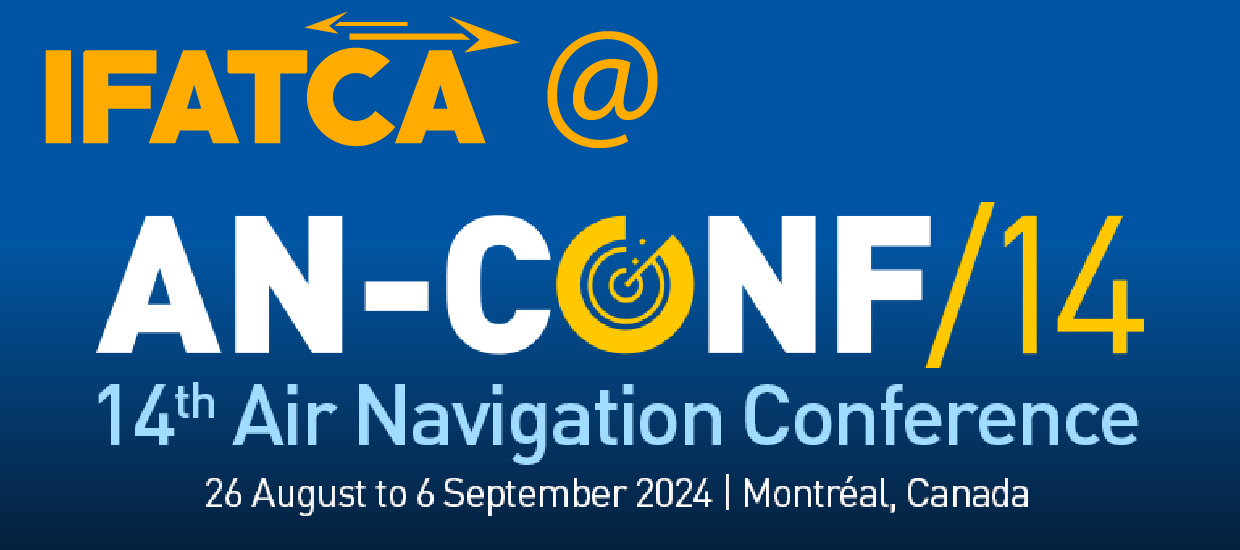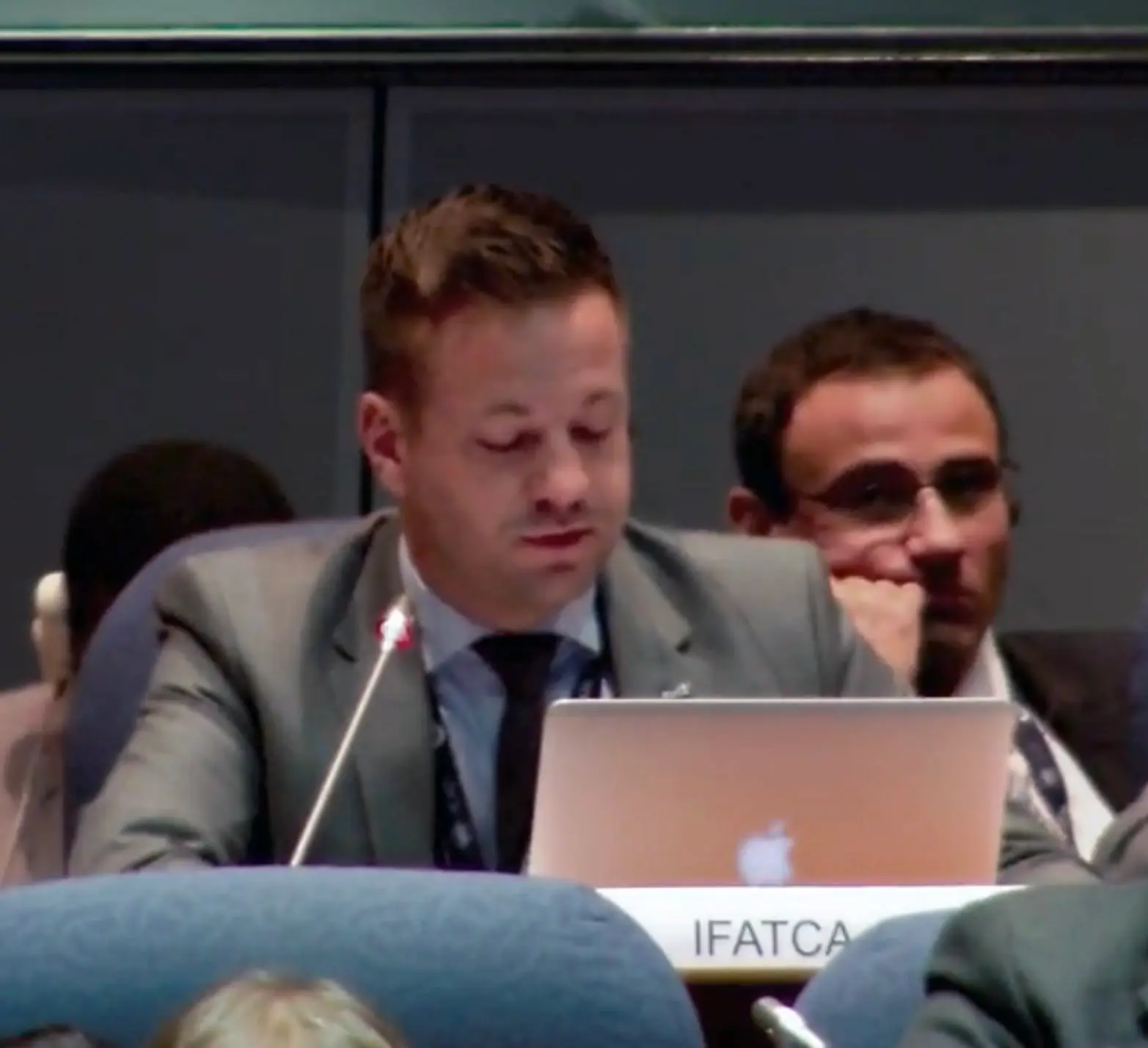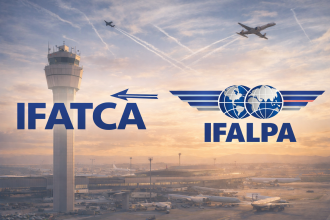The fourteenth ICAO Air Navigation Conference kicked off this week in Montréal, Canada. The central theme for the meeting is “Performance Improvement Driving Sustainability” and its the objective is to reach a global consensus on performance improvement initiatives that will best allow ICAO, Member States and industry to address, in the context of constrained resources, aviation’s global environmental challenges and the rapid evolution in aviation operations and technologies.
The Conference is open to all Member States. Representatives from non-member states and international organizations, such as IFATCA, can participate with observer status. The working papers for the AN-CONF/14 can be found here.
The Conference’s recommendations will be submitted for approval to the Council and, when applicable, for subsequent endorsement by the 42nd Session of the Assembly in 2025.
IFATCA’s delegation consists of Jean-François Lepage, our Deputy President and outgoing Liaison Officer to the ICAO ANC; and his successor in the role of ICAO Liaison, David Perks. Their interventions are collected on this page.
The Air Navigation Conference ends on September 6th, 2024.
Interventions
- System-Based ATCO Licensing (WP116) & Age Limits (WP106)
- Feasibility Study Into Establishing an ICAO Air Navigation Efficiency Audit Programme (WP09) & Optimization of Longitudinal Separation Across FIR Boundaries (WP10)
- Enhancing Seamless Air Traffic Management by Establishing a Framework for Cross-Border Services (WP89) & Cross-Border Operations of Air Traffic Services (WP115)
- Regulations for the Development of Digital Control Tower and Remote Control Tower Technology Standards for the Certification of Service Providers (WP139)
- Cybersecurity in the Provision of Air Traffic Services (WP125)
Transcript
With respect to Working Paper 116, presented by ITF, IFATCA acknowledges that the skills and knowledge required to operate a given air traffic control system can be transferable under the right circumstances and may facilitate the flexible use and mobility of air traffic controllers. However, as highlighted in the paper, the training required to become proficient on a particular system constitutes only one element of a comprehensive training and assessment program. It is IFATCA’s view that it cannot be considered in isolation and without the knowledge and skills particular to the rating, endorsement, and/or qualification required by an air traffic controller to perform a range of air traffic control functions. The competency-based training and assessment methodology that we can find in past training already provides air navigation service providers with a high degree of mobility and flexibility when it comes to the deployment of air traffic controllers.
IFATCA would also wish to comment on Working Paper 106, and we support the comments made by IFALPA. Pilots and air traffic controllers have similar medical requirements and in this regard, typically face similar challenges regarding medical matters. While there are examples of states having different age limits, indeed some of them have no limits at all. IFATCA would like to stress that should any changes be proposed to the age limits for air traffic controllers and pilots, they should be supported by clear and unambiguous evidence. IFATCA recognizes that as the aviation industry continues to evolve, existing standards and recommended practices should continue to be challenged as to their safety, relevance, and utility. However, when considering changes to age limits, whether for pilots, controllers, or other aviation professionals, safety should always remain our top priority.
Finally, Mr. Chair, IFATCA supports IFALPA’s position that any proposals to amend age limits should also be accompanied by appropriate considerations of fatigue, risk, and principles.
Transcript
The International Federation of Air Traffic Controllers Associations, IFATCA, would like to speak to Working Papers 9 and 10.
IFATCA supports Working Paper 9 presented by the Secretariat.
As air traffic levels continue to increase, it is in the interests of all aviation stakeholders to ensure that limited airspace capacity is utilised efficiently. However, for those charged with this responsibility, it can be difficult to know how and where to apply increasingly limited resources.
An efficiency audit programme may provide opportunities for Stakeholders to more effectively target areas for improvement and result in greater synergies with the international aviation community. It may also help to realise the universally recognised principle that no country is left behind’, as mentioned in AN-Conf-13 Recommendation 4.3/1.
Conducting a feasibility study into an efficiency audit programme would be an important first step whilst ensuring that affected stakeholders would have an opportunity to be part of the development process. Therefore, IFATCA supports the feasibility study into establishing an ICAO air navigation efficiency audit programme.
IFATCA supports the goals of the Project 30/10 initiative, as presented in Working Paper 10.
Recent advancements in communication, navigation and surveillance performance capabilities have resulted in significant reductions in the longitudinal separation minima required between aircraft. Whilst many ANSPs have taken advantage of these reduced separation minima, for a variety of reasons, a significant number still use larger separation minima.
Not only does this result in a less efficient use of airspace, it negates the significant investments made by many aircraft operators and ANSPs that have facilitated the implementation of reduced separation minima. It also creates complexity and workload issues for air traffic controllers who have to plan for different separation minima across FIR boundaries.
IFATCA appreciates that each ANSP has unique challenges when implementing new separation minima and therefore supports the intent of Project 30/10 to encourage implementations through regional collaboration and mutual support.
IFATCA also agrees with our colleagues from Australia in that the initiative could also be extended to lateral separation minima, as appropriate.
Transcript
With respect to working papers 89 and 115, IFATCA acknowledges the benefits that seamless air traffic management and cross-border agreements can provide. Indeed there are a number of examples where bespoke agreements have been achieved and they continue to provide benefits to all parties.
However, there also needs to be a thorough appreciation of the challenges involved including, but not limited to, the harmonisation of licensing, training, procedures and regulatory requirements.
Whilst there may be potential for a framework to assist parties negotiating cross-border agreements, the challenge is to ensure it remains broad enough to permit the flexibility required to manage these complexities, yet at the same time not be so broad as to lose any utility.
IFATCA welcomes Working Paper 139 from Colombia and supports its intent. As noted by the Chief ATM, this work is being progressed through the Digital Aerodrome Air Traffic Services (or DAATS) WG of ATMOPS Panel.
IFATCA would also like to highlight that when developing any standards and recommended practices or guidance material for DAATS, it should include:
- Requirements for surveillance equipment capable of providing the required service level.
- A robust contingency plan in case of system failure.
- Safety outcomes equivalent to or greater than existing facilities.
Regarding recommendation c), IFATCA notes the performance-based approach favoured for implementing other surveillance, navigation, and communication systems and would encourage a similar technology-agnostic approach for systems designed to support DAATS.
IFATCA also shares the concerns expressed by our IFALPA colleagues and also believes they should be addressed by the relevant expert group.
IFATCA acknowledges the growing threat that cybersecurity is having on the ability to provide a safe and reliable air traffic service and thanks LACAC for working paper 125.
IFATCA also acknowledges the priority ICAO has given to cybersecurity issues as demonstrated by the creation of the Cybersecurity Panel.
With regards to action item c), IFATCA strongly supports defining the skills and competencies required for air traffic controllers to safely manage cyber events. At present, the competency based training and assessment framework for air traffic controllers in PANS-TRG does not contain provisions for such events. As such, IFATCA sees an opportunity for the appropriate expert groups to provide leadership in this area.
When considering the development any new material, IFATCA suggests that there should be a clear distinction between the skills and competencies required for air traffic controllers to tactically manage a cyber event thus ensuring the continuous provision of a safe air traffic service, and the more comprehensive response that only trained air traffic safety electronic personnel, or ATSEPs, can and should provide.








